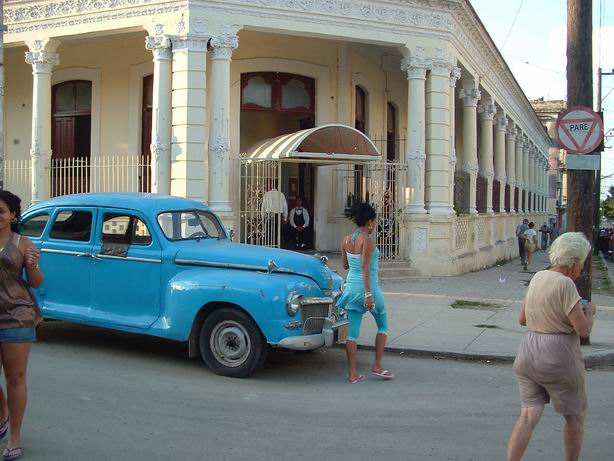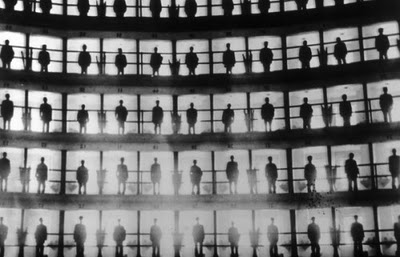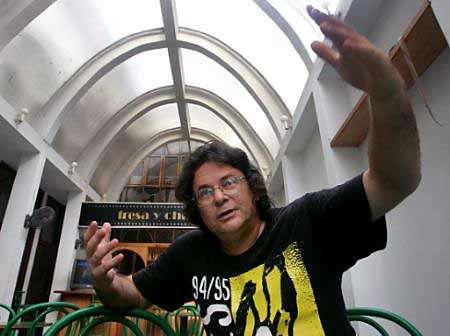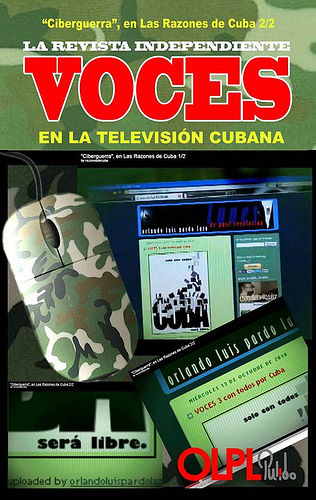 Here is another article by Normando Hernandez Gonzalez, Cuban ex-prisoner of conscience currently exiled in Spain. In this essay, Normando makes it clear that exiling, deporting, or simply releasing from prison is not the same thing as being freed, which is a common misconception. The civic Cuban fighter states that dissidents, and ordinary Cubans, will not achieve real freedom until the cynical and totalitarian laws which took people like him to jail for demonstrating peacefully are repealed.
Here is another article by Normando Hernandez Gonzalez, Cuban ex-prisoner of conscience currently exiled in Spain. In this essay, Normando makes it clear that exiling, deporting, or simply releasing from prison is not the same thing as being freed, which is a common misconception. The civic Cuban fighter states that dissidents, and ordinary Cubans, will not achieve real freedom until the cynical and totalitarian laws which took people like him to jail for demonstrating peacefully are repealed.
In his own words:
Deportation or Release from Prison is not Freedom
by Normando Hernandez, ex prisoner of conscience
For those who think that with the release of the last 2 prisoners of conscience from the group of the 75, the Cuban government has given freedom to all the peaceful dissidents from the Black Spring who were in prison, I hate to say that you are wrong.
Don’t fall for their lies. Deportation or release from prison is not freedom. Pushing people out of the prisons under Extra Penal Licenses is also not synonymous with granting freedom. Freedom, among its many meanings, signifies having the “right to do and say anything as long as it does not violate any laws”.
And the Cuban laws are there, very active, constantly jailing, assassinating all sorts of freedoms, inalienable rights, and political dissent.
Those who were released under Extra Penal Licenses are still restricted by article 53 of the Constitution of the Cuban Republic (CRC) which prohibits them from expressing any words which go against the purposes of socialist society. In addition, they are also prisoners of Article 39 of that same Constitution which does not permit creative freedom if it is contrary to the Revolution.
Released dissidents cannot legally and peacefully organize themselves because the Cuban government does not acknowledge the existence of other political, social, cultural, or economic organizations to which they (dissidents) belong. This is all because such organizations do not agree with the “tasks of building, consolidating, and defending the ideals of a socialist society” as set forth by article 7 of the CRC.
In addition, these same dissidents are not granted the majority of the inalienable freedoms and rights protected by the Universal Declaration of Human Rights, for the sole reason that the rights defended by the Universal Declaration go against the establishments of the Cuban laws, which state in article 62 that “none of the freedoms granted to citizens can be exercised against the establishments of the constitution and the laws, the existence and goals of the socialist State, or against the decisions of constructing socialism and communism”. And to top it off, this article concludes with a threat: “the violation of this principle is punishable”.
And for those who still doubt, there are the tribunals which, according to the CRC in article 121, “constitute a system of state organs which are hierarchical subordinates of the National Assembly of Popular Power and to the State Council”. We cannot forget that the State in Cuba is a totalitarian one.
As one can clearly see, those who have been released from jail continue being prisoners as long as Cuban constitutional laws do not guarantee individual, collective, social, and political rights, as well as any other fundamental rights. They will continue being prisoners as long as Law 88, best known as the Gag Law, is in practice. They will continue being prisoners as long as there exist any judicial restrictive norms which impede people from practicing their freedoms, and from being able to work in favor of coexistence among all those who seek freedom and democracy.
We can’t forget that the sanctions of those who were condemned were never repealed, and the laws which led to our imprisonment have not been abolished. However, we have all committed to continuing the peaceful struggle in search for Cuba’s freedom, “with all and for the good of all”, as our apostle, Jose Marti, would say.
Let us help him fulfill his promise.
28 March 2011
This post taken from Pedazos de la Isla (Pieces of the Island), where some of the political prisoners — now in exile — who formerly blogged in “Voices Behind The Bars” post their writings.




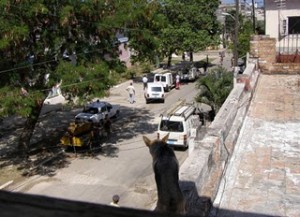 Migdalia Estévez and her husband, Ramon Suarez, were waiting for “Cuba’s Reasons,” the TV series aired on Mondays on the island. They understood what subversion is, the media war, and the imperialist maneuvers. But they still don’t understand the government’s bitter struggle against cable TV or satellite dishes.
Migdalia Estévez and her husband, Ramon Suarez, were waiting for “Cuba’s Reasons,” the TV series aired on Mondays on the island. They understood what subversion is, the media war, and the imperialist maneuvers. But they still don’t understand the government’s bitter struggle against cable TV or satellite dishes.
